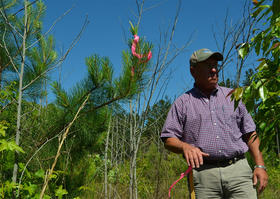Georgia Property Owners Fight Fuel Pipeline Plan

Most people at a public hearing in Waynesboro, Georgia, in early May opposed the use of eminent domain to build the Palmetto Pipeline.
MOLLY SAMUEL / WABE
A fight is raging over a pipeline on the Georgia coast. If it’s built, it would carry gasoline and diesel through Savannah, Georgia, to Jacksonville, Florida. And the company that would build it wants to take over private land to do it.
‘Feel Like You’re Being Run Over’
Eddie Reddick owns a tree farm near the South Carolina border, and he is mad.
“This tree’ll eventually die,” he says, pulling on the crooked trunk of a young pine tree.
We’re on his family’s 845-acre property in Screven County. Reddick says a few weeks ago, surveyors for the energy company Kinder Morgan came out, and they drove over some of his young pine trees.
“See, there’s a nice vigorous growing seedling, about 7 foot tall, that’s been run over,” he says.

Now, that tree and others in its row are bent over sideways, like long grass on a windy day. They’re all pointing in the same direction: Toward a wooden stake with a pink ribbon fluttering at the top.
“Here’s the first stake, and it says proposed pipeline,” he says.
This is where the Palmetto Pipeline would travel through Reddick’s land.
The energy company Kinder Morgan wants to build the 360-mile pipeline along the Savannah River and then down the coast. It would split off from another bigger pipeline the company owns that carries gas from Gulf Coast refineries, through Atlanta, to the Northeast.
Reddick says he thinks the pipeline would take about 4.5 acres of his farm permanently out of production, though it could be more, since he says Kinder Morgan’s plans aren’t exactly clear.
That’s a small amount of land for Reddick. But he says it’s the principal of the thing because Kinder Morgan wants to use eminent domain to build this pipeline. That leaves Reddick feeling like those crushed seedlings.
“As a private land owner, feel like you’re being run over,” he says.

If the government was taking over private property for national security, Reddick says he’d gladly step up. But he doesn’t like the idea of a private company getting permission from the state to take his land.
The Case For The Pipeline
Right now, Savannah’s fuel comes from ships or trucks, but a pipeline would be cheaper and more reliable, says Allen Fore, a vice president with Kinder Morgan.
“Savannah in particular is one of the few areas that doesn’t have direct pipeline capacity,” says Fore.
It would cost a billion dollars to build and eventually carry about 150,000 barrels of fuel a day. Fore says all of the gas is for domestic use, not for export.
“We’re looking at not just service now and what the needs are now in Georgia, but we’re trying to look at the next 20-30 years,” he says.
More than half of the fuel would go to Jacksonville. Only about a sixth would go to Savannah.
Fore says Kinder Morgan doesn’t want to use eminent domain to build the pipeline, except where it has to.
“Our use of that, if granted, is extremely rare,” he says. “It’s usually less than 2 percent. Over 98 percent of properties are acquired by amicable resolution to the satisfaction of land owners. So we’re talking about a small, very small number of land owners.”
The Public Response
But a lot of land owners are upset about the idea. At a public hearing in Waynesboro earlier this month, a couple hundred people turned out, most of them to oppose the project.
“My mama’s people, and my daddy’s people, been here since the 1700s,” said Jeff Mallard. “I don’t agree with eminent domain.”
About 40 people spoke, including Jen Hilburn, from the environmental organization Altamaha Riverkeeper.
“Our precious wetlands, our five major rivers, all will be impacted, both when the pipeline goes in, if it does,” she said. “And afterwards, because it’s not a matter of if there’s a spill, it’s a matter of when.”
But before the pipeline project undergoes environmental review, eminent domain has to be granted. In Georgia, that decision is up to the commissioner of the Department of Transportation, a man named Russell McMurry.
Using eminent domain for a private company isn’t unheard of, said University of Georgia law professor Peter Appel.
“People want to say this is my property and you can’t have it,” says Appel. “The fact of the matter is, that’s not true.”
Eminent domain serves a purpose, says Appel. The government uses it to build highways, post offices and parks. And, yes, the state can grant it to private companies, too.
“A pipeline, similar to a railway line, is almost a classic case for when eminent domain makes sense,” he says.
That’s because it’s going to serve the public by delivering gas, and its route isn’t very flexible. Kinder Morgan can’t twist and turn around every land owner who doesn’t want to sell. The company that wants to build the Keystone XL pipeline to carry crude oil from Canada to Texas refineries hopes to use eminent domain, too.
But Appel says just because the pipeline is a good candidate for public domain, doesn’t mean Georgia has to grant it.
“It really is up to the government to decide are we going to put our power behind this project?” says Appel.
Gov. Nathan Deal came out against the plan earlier this month.
GDOT’s decision on eminent domain is expected to come Tuesday. If the commissioner gives the go-ahead, then the plan goes to the state Department of Natural Resources for permitting.
9(MDAxODM0MDY4MDEyMTY4NDA3MzI3YjkzMw004))








